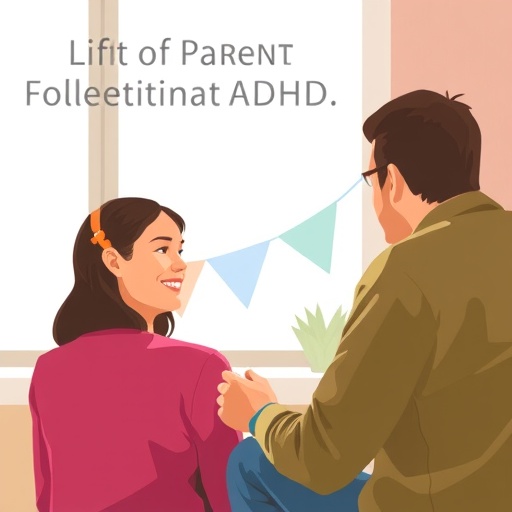In a rapidly evolving landscape of mental health research, one of the most compelling areas of study involves the social dynamics between adolescents and their parents, particularly concerning youth diagnosed with Attention-Deficit/Hyperactivity Disorder (ADHD). The recent study led by a team of researchers, including Kaya Kara, S. Muftuoglu, and K. Kara, embarks on a critical exploration of adolescent-parent agreement on community participation, highlighting the implications for both treatment and social engagement of youths on and off the ADHD spectrum.
ADHD affects millions of adolescents worldwide, bringing with it a range of challenges not solely limited to academic difficulties but extending into social environments and community interactions. It is essential to differentiate between the experiences of adolescents with ADHD and their peers without such diagnoses. This research challenges the prevailing notion that parents and their children perceive community participation similarly, opening a dialogue about how ADHD influences social interactions and parenting approaches.
Understanding the familial perspective—where parents and adolescents share or differ in their understanding of community involvement—offers key insights into how ADHD shapes these relationships. It is especially crucial as parents often play a pivotal role in fostering or hindering social skills and community engagement. The nuances of this dynamic can significantly influence the developmental path of young individuals navigating adolescence amid the complexities brought on by ADHD.
One significant aspect of the research is its focus on the lived experiences of both parties involved: the adolescents themselves and their parents. By employing a qualitative approach, the study foregrounds the subjective experiences that inform the broader statistical trends often presented in psychological research. This illuminates the unique challenges faced by adolescents with ADHD, who may feel a disconnect between their own aspirations for community interaction and their parents’ perceptions or expectations.
As the study reveals, there is often a disparity in how parents and adolescents view opportunities for community engagement. For adolescents with ADHD, feelings of anxiety, forgetfulness, and impulsivity may cause them to distance themselves from various social opportunities. Conversely, parents might emphasize participation as a pivotal factor in their child’s social development, underscoring a potential rift in understanding. This gap is compounded by the common stereotypes and societal biases surrounding ADHD, which can amplify the feelings of alienation among affected youths.
The research also delves into the implications of these findings for therapeutic settings, suggesting that greater alignment between adolescent and parental views on community participation can lead to more effective support mechanisms within familial structures. Therapeutic professionals can leverage this understanding to bridge the gap between parents’ expectations and adolescents’ realities, fostering a collaborative approach in community engagement efforts.
Moreover, this inquiry extends beyond individual families; it touches on community-level implications. Communities that foster inclusivity and adapt to the needs of diverse youth populations, including those with ADHD, may cultivate environments that encourage active participation. Highlighting the importance of tailored community programs can motivate local authorities and organizations to think critically about how to support these young people in a way that resonates with both their capabilities and their parents’ aspirations.
The study raises essential questions about knowledge sharing within families and how different communication styles may affect adolescents’ self-perception and confidence in social situations. If adolescents with ADHD perceive that their opinions are undervalued or misunderstood, it could lead to a decrease in self-esteem and increased social withdrawal. Hence, understanding the communication barriers that exist can play a key role in establishing effective dialogue between parents and adolescents.
Furthermore, this research underscores the necessity for tailored educational programs within school environments that take into account the voices of both youths and their parents. Team programs that involve parents in school activities related to social engagement may help cultivate a shared understanding of the benefits these activities can provide. This collaborative environment can pave the way for increased participation and shared experiences, reinforcing the bond between parents and their children.
An additional layer is added through the exploration of community dynamics. Often, communities offer limited programs that do not adequately cater to the needs of youth with ADHD, perpetuating feelings of isolation. This study calls for a more significant push towards creating adaptive programs accommodating various needs and abilities, thus fostering a sense of belonging and commitment among adolescents.
In conclusion, the findings from the study led by Kaya Kara, Muftuoglu, and Kara illuminate the complexities surrounding adolescent-parent relationships in the context of ADHD. By showcasing the often overlooked discrepancies in perceptions of community participation, this research advocates for a more nuanced understanding of how familial dynamics influence social engagement for youths. It suggests actionable recommendations for both practice and policy aimed at improving community integration strategies, which are essential for nurturing a supportive environment that recognizes the unique challenges faced by adolescents—both with and without ADHD.
Through an informed approach that prioritizes dialogue, education, and community support, we can better serve youth populations, fostering not only individual growth but also enriched family relationships that contribute to thriving community dynamics. As we look toward the future, this research represents a vital step in transforming how we view adolescent engagement, encouraging a culture of understanding and collaboration.
Subject of Research: Adolescent-parent Agreement on Community Participation in Youth with and without ADHD.
Article Title: Adolescent–parent Agreement on Community Participation in Youth with and without ADHD.
Article References:
Kaya Kara, O., Muftuoglu, S., Kara, K. et al. Adolescent–parent Agreement on Community Participation in Youth with and without ADHD.
J Child Fam Stud (2025). https://doi.org/10.1007/s10826-025-03186-w
Image Credits: AI Generated
DOI: 10.1007/s10826-025-03186-w
Keywords: ADHD, adolescent-parent dynamics, community participation, social engagement, family relationships.




